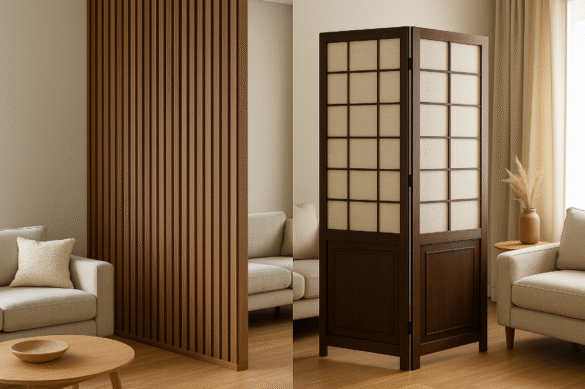When it comes to creating distinct areas in a home or office without constructing permanent walls, room dividers are the go-to solution. From classic wooden screens to modern minimalist panels, there are plenty of choices. But as design trends evolve and practical needs shift, WPC (Wood Plastic Composite) wall partitions have emerged as a highly functional and stylish alternative to traditional room dividers.
So, which one is better for your space WPC wall partitions or traditional dividers? In this blog, we’ll compare both across important categories like durability, aesthetics, maintenance, installation, cost, and environmental impact. Whether you’re redesigning your home, upgrading your office, or looking for space-saving ideas, this guide will help you make the smartest decision.
What Are Traditional Room Dividers?
Traditional room dividers include:
- Folding wooden screens
- Fabric or curtain-style dividers
- Glass partitions
- MDF or plywood panels
- Sliding barn doors or shoji screens
They’ve been around for decades and are widely used for privacy, zoning, and decorative enhancement.
What Are WPC Wall Partitions?
WPC (Wood Plastic Composite) partitions are modern panels made by combining wood fibers and thermoplastic polymers. These partitions offer the visual charm of wood but with superior performance and moisture, termite, and warp resistance.
WPC panels come in fluted, slatted, solid, or laser-cut formats, and they can be fixed, floating, or even modular.
- Durability & Lifespan
Traditional Room Dividers:
- Wooden or MDF screens are prone to warping, chipping, and moisture damage
- Fabric and curtain dividers may fade or tear over time
- Glass can crack and requires delicate handling
WPC Wall Partitions:
- Highly durable, resistant to water, rot, and termites
- Long-lasting even in humid environments
- Doesn’t chip, splinter, or degrade like natural wood
Winner: ✅ WPC Wall Partitions
- Maintenance Requirements
Traditional Dividers:
- Wood needs regular polishing and dusting
- Fabric requires washing or dry cleaning
- Glass must be frequently cleaned to prevent smudges
WPC Panels:
- Low maintenance
- Easy to clean with a damp cloth
- No polishing, painting, or sealing required
Winner: ✅ WPC Wall Partitions
- Visual Appeal & Customization
Traditional Dividers:
- Offer a classic, vintage, or rustic feel
- Available in antique, upholstered, or artisan-crafted styles
- Limited color variety unless custom-made
WPC Panels:
- Modern, sleek, and customizable in color and texture
- Available in wood-look finishes, bold matte tones, or geometric cutouts
- Integrates beautifully with contemporary interiors
Winner: 🎯 Tie (depends on style preference)
- Functionality & Versatility
Traditional Dividers:
- Typically foldable and portable
- Good for temporary use
- Ideal for renters or temporary installations
WPC Wall Partitions:
- Can be freestanding, mounted, or modular
- Often used for semi-permanent or architectural zoning
- Great for offices, studios, modern homes
Winner: ✅ WPC for permanent, stylish zones
Traditional dividers for short-term use
- Installation Process
Traditional Dividers:
- No installation needed
- Simply unfold or hang
- Suitable for small-space users or renters
WPC Panels:
- Require basic tools for wall or ceiling mounting
- Some modular systems are DIY-friendly
- More suitable for people seeking a fixed design
Winner: ✅ Traditional Dividers for ease
✅ WPC for long-term, seamless look
- Cost Comparison
Traditional Dividers:
- Basic fabric or wood screens: $50–$300
- Custom handcrafted dividers: $400+
WPC Wall Partitions:
- Basic fluted panels: $100–$300 per unit
- Custom finishes or laser-cut styles: $350–$600
- Long-term value outweighs upfront cost
Winner: 💸 Traditional Dividers for short-term budget
💰 WPC Partitions for better long-term ROI
- Eco-Friendliness
Traditional Dividers:
- Often made from solid wood or MDF (not always sustainable)
- Fabrics may be synthetic or non-recyclable
- Limited reuse potential
WPC Wall Partitions:
- Made from recycled wood fibers and plastics
- Minimizes waste and promotes sustainability
- Eco-certified options available
Winner: ✅ WPC Wall Partitions
- Sound and Light Control
Traditional Dividers:
- Fabric or wood can block light completely
- Not sound-insulating
- Often used for visual privacy only
WPC Panels:
- Semi-open or fluted designs allow light diffusion
- Some versions offer acoustic absorption qualities
- Ideal for semi-private settings like offices or living rooms
Winner: ✅ WPC for light and privacy balance
Traditional dividers if full light block is preferred
Ideal Uses for Each Type
| Use Case | Best Option |
| Quick visual privacy | Traditional Divider |
| Stylish room zoning in modern home | WPC Partition |
| Semi-permanent office divider | WPC Partition |
| Boho-style or vintage interiors | Traditional Divider |
| Humid environments (kitchen, bath) | WPC Partition |
| Temporary space separation | Traditional Divider |
| Modern minimalist design | WPC Partition |
Bonus: Hybrid Use Ideas
You don’t have to choose just one! Many designers now combine both WPC panels and traditional dividers for layered visual interest and functionality.
- Use WPC panels as fixed backdrops, and add foldable screens as movable layers
- Combine a WPC partition with curtain drapes for a soft and modern mix
- Install WPC panels as a base, and hang fabric or macramé for texture
Real-Life Examples
Home Office Corner in a Studio Apartment:
A WPC slatted wall panel creates visual separation from the bed, while a small wooden screen adds texture and mobility.
Restaurant Layout:
WPC partitions are installed between dining zones for a sleek modern look, while fabric curtains are used for private booths.
Corporate Co-Working Space:
WPC panels with acoustic backing reduce noise between desks, while moveable whiteboard dividers support collaboration.
Final Verdict: Which One Should You Choose?
Ultimately, your decision depends on your space, goals, and style. Here’s a quick summary:
| Category | Winner |
| Durability | WPC Wall Partition |
| Maintenance | WPC Wall Partition |
| Aesthetics | Tie |
| Functionality | Depends on usage |
| Installation | Traditional Divider |
| Cost | Traditional (short-term) |
| Sustainability | WPC Wall Partition |
| Long-Term Value | WPC Wall Partition |
✅ Choose WPC Wall Partitions if you:
- Want a long-term, low-maintenance, stylish solution
- Are designing a modern home, office, or café
- Value eco-friendliness and durability
- Need custom finishes or architectural style zoning
✅ Choose Traditional Dividers if you:
- Want a budget-friendly, portable option
- Are decorating a small apartment or rental
- Prefer a vintage, boho, or classical aesthetic
- Need quick, non-permanent solutions
WPC wall partitions are more than just functional they’re a modern interior design tool that brings style, structure, and sustainability into your space. If you’re planning a renovation or rethinking your layout, investing in WPC might just be the smartest move.



